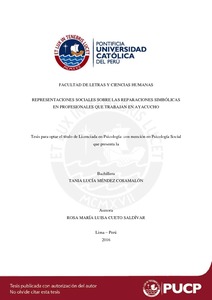| dc.contributor.advisor | Cueto Saldivar, Rosa María Luisa Martina | es_ES |
| dc.contributor.author | Méndez Cosamalón, Tania Lucía | es_ES |
| dc.date.accessioned | 2017-02-07T14:46:35Z | es_ES |
| dc.date.available | 2017-02-07T14:46:35Z | es_ES |
| dc.date.created | 2016 | es_ES |
| dc.date.issued | 2017-02-07 | es_ES |
| dc.identifier.uri | http://hdl.handle.net/20.500.12404/7695 | |
| dc.description.abstract | El presente estudio tiene como objetivo principal conocer las representaciones sociales que se tienen sobre las reparaciones simbólicas en profesionales que trabajan temas sobre derechos humanos en Ayacucho. De manera específica, la investigación busca describir y explorar las creencias, actitudes y prácticas que comprenden tales representaciones. Para ello, se realizó un estudio cualitativo con 14 profesionales que se encontraban trabajando en Ayacucho, en donde se aplicó una entrevista semiestructurada elaborada por la investigadora. Los resultados describen la reparación simbólica a través de tres áreas de análisis: Verdad, Justicia y Memoria. Los resultados son discutidos en relación a las particularidades que enfrentan ciertos países después de un contexto de violencia. Asimismo se realizan comparaciones con estudios que ponen en debate el uso de rituales de justicia transicional, desde las particularidades contextuales donde se llevó a cabo la implementación de las reparaciones por la violencia en el departamento de Ayacucho. | es_ES |
| dc.description.abstract | The primary objective of this study is to understand the social representations of symbolic reparations among professionals that work in human rights issues in Ayacucho. The researcher seeks to describe and explore the beliefs, attitudes and practices in relation to this theme. Employing qualitative research methods, the study includes 14 professionals working in Ayacucho, who all participated in semi-structured interviews developed by the researcher. The results describe the symbolic reparations through three areas of analysis: Truth, Justice and Memory. The results are discussed in relation to the formative period countries go through following episodes of violence, and they are compared with studies that discuss the use of transitional justice rituals, specifically where reparations are implemented in the department of Ayacucho. | es_ES |
| dc.language.iso | spa | es_ES |
| dc.publisher | Pontificia Universidad Católica del Perú | es_ES |
| dc.rights | Atribución-NoComercial-SinDerivadas 2.5 Perú | * |
| dc.rights | info:eu-repo/semantics/openAccess | es_ES |
| dc.rights.uri | http://creativecommons.org/licenses/by-nc-nd/2.5/pe/ | * |
| dc.subject | Representaciones sociales. | es_ES |
| dc.subject | Reparaciones para injusticias históricas--Perú--Ayacucho. | es_ES |
| dc.subject | Reconciliación. | es_ES |
| dc.subject | Derechos humanos. | es_ES |
| dc.title | Representaciones sociales sobre las reparaciones simbólicas en profesionales que trabajan en Ayacucho | es_ES |
| dc.type | info:eu-repo/semantics/bachelorThesis | es_ES |
| thesis.degree.name | Licenciado en Psicología Social | es_ES |
| thesis.degree.level | Título Profesional | es_ES |
| thesis.degree.grantor | Pontificia Universidad Católica del Perú. Facultad de Letras y Ciencias Humanas | es_ES |
| thesis.degree.discipline | Psicología Social | es_ES |
| renati.discipline | 313066 | es_ES |
| renati.level | https://purl.org/pe-repo/renati/level#tituloProfesional | es_ES |
| renati.type | http://purl.org/pe-repo/renati/type#tesis | es_ES |
| dc.publisher.country | PE | es_ES |
| dc.subject.ocde | http://purl.org/pe-repo/ocde/ford#5.01.00 | es_ES |






